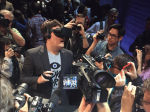- Facebook was sued for $2 billion by Zenimax Media, the former employer of an Oculus executive.
- A jury awarded Zenimax $500 million, which was subsequently reduced to $250 million. Both parties sought appeals.
- Facebook and Zenimax reached a settlement in December 2018, a little more than four years after litigation began. The terms are private.
Facebook is, by far, the largest social media platform on Earth. Nearly 2 billion people use it — just over 25% of the planet's population.
But the company's vision for the future goes beyond baby photos and shareable headlines: The $2 billion acquisition of Oculus VR in 2014 was a strong indication of what's next for Facebook.
Indeed, CEO Mark Zuckerberg and company see virtual reality as an integral part of Facebook's future. And that future is off to a rocky start.
Weak sales of the company's first VR headset, the Oculus Rift, are just the beginning. Two months after Facebook purchased Oculus VR, Facebook was sued for $2 billion. The company that sued, Zenimax Media, claimed that a former employee-turned-Oculus CTO took trade secrets with him. Moreover, the suit claimed that those trade secrets were integral to the Oculus Rift headset.
A classic he said/she said litany of statements flowed from both companies, and a two-week jury trial concluded in 2017. Zuck himself even appeared in court for questioning. The result? Facebook was ordered to pay Zenimax $500 million, but no one's to blame. And now, after a 50% award reduction that sparked appeals from both parties, the case was apparently settled for an undisclosed sum out of court.
Here's what's going on.
August 2013: Oculus VR, a startup working on a virtual reality headset called the Rift, hires "Doom" creator John Carmack of id Software as its chief technology officer.G4TVFrom the very first days of the Oculus Rift — when it was little more than snowboard goggles, duct tape, and wires — legendary programmer John Carmack was involved. When the Rift was first demonstrated for press, in 2012 at E3 (an annual video game industry trade show), it was demonstrated by John Carmack.
Carmack showed off a version of "Doom 3" running in the Oculus Rift headset. It would be another year before he officially resigned from id Software, which he cofounded, to become the CTO of Oculus VR.
Of note: id Software was founded in 1991, and then sold to Zenimax Media in 2009.
Carmack got the prototype headset from Palmer Luckey, the young poster boy of the Oculus Rift. He was repeatedly held up as the genius inventor behind the headset.Oculus screencap
So the story goes: Palmer Luckey was working on the Oculus Rift headset's earliest prototypes from his parents' house. Luckey was a member of several forums dedicated to the world of 3D and, eventually, virtual reality. He was a part of the "mod" community, which is notorious for taking existing hardware and modifying it into something new — a portable Xbox 360, or a GameBoy that plays Super Nintendo games, for instance.
On the journey from ski-goggle prototype to something sellable, Carmack — an idol of Luckey's and, apparently, a member of the same VR forum — got in touch and asked to be sent a prototype. Wired catalogued the exchange in a 2014 story timed to publish soon after the Facebook acquisition:
"Carmack private-messaged him. Would Palmer consider sending him a loaner unit? Palmer, who idolized Carmack, shipped it off to Texas immediately — 'no NDAs, no signing anything,' Carmack says. 'It was one of two prototypes that he had.'
Carmack got to work on the machine, hot-gluing a motion sensor to it and duct-taping on a ski-goggle strap. But his greatest contribution came in the code he wrote for it. The Rift’s biggest selling point was its 90-degree field of view, which Luckey accomplished by slapping a cheap magnifying lens on the display. The problem was, that lens distorted the image underneath, making it warped and uneven. So Carmack coded a version of 'Doom 3' that pre-distorted the image, counteracting the effects of the magnifying lens and making the picture appear correct to the viewer. The result was a completely immersive gaming experience, the kind that would otherwise require $10,000 in high-end optics."
March 2014: Facebook buys Oculus VR.Facebook
In March 2014, Facebook announced the acquisition of Oculus VR — an independent startup. Unlike Instagram or Whatsapp, it was less obvious why Facebook would buy a fledgling startup that was, at the time, creating the first major VR headset since the technology faded from popularity in the mid-'90s.
Zuckerberg justified the purchase as such:
"History suggests that there will be more platforms to come. Today's acquisition is a long-term bet on the future of computing."
In Zuckerberg's eyes, the folks at Oculus VR were creating "the future," and he wanted Facebook to be integral in building that vision of the future.
May 2014: Zenimax Media sues Oculus VR, now owned by Facebook.stuff.co.nz
Just two months after Facebook announced its acquisition of Oculus VR, Zenimax announced its intent to sue Oculus and, by extension, Facebook.
At the heart of the suit was the contention that John Carmack allegedly took company secrets with him when he left id Software (owned by Zenimax) for Oculus (owned by Facebook). Before filing suit, Zenimax lawyers contacted Oculus VR with those claims. Zenimax provided media with the following statement at the time:
"Zenimax confirms it recently sent formal notice of its legal rights to Oculus concerning its ownership of key technology used by Oculus to develop and market the Oculus Rift. Zenimax's technology may not be licensed, transferred or sold without Zenimax Media's approval. Zenimax's intellectual property rights arise by reason of extensive VR research and development works done over a number of years by John Carmack while a Zenimax employee, and others. Zenimax provided necessary VR technology and other valuable assistance to Palmer Luckey and other Oculus employees in 2012 and 2013 to make the Oculus Rift a viable VR product, superior to other VR market offerings.
The proprietary technology and know-how Mr. Carmack developed when he was a Zenimax employee, and used by Oculus, are owned by Zenimax. Well before the Facebook transaction was announced, Mr. Luckey acknowledged in writing Zenimax's legal ownership of this intellectual property. It was further agreed that Mr. Luckey would not disclose this technology to third persons without approval. Oculus has used and exploited Zenimax's technology and intellectual property without authorization, compensation or credit to Zenimax. Zenimax and Oculus previously attempted to reach an agreement whereby Zenimax would be compensated for its intellectual property through equity ownership in Oculus but were unable to reach a satisfactory resolution. Zenimax believes it is necessary to address these matters now and will take the necessary action to protect its interests."
A war of words ensued. Here's what Oculus/Facebook had to say at the time:Oculus VR / Facebook
As you might imagine, Facebook and Oculus didn't throw up their hands and say, "You got us!"
Instead, the following statement was issued to the press:
"It's unfortunate, but when there's this type of transaction, people come out of the woodwork with ridiculous and absurd claims. We intend to vigorously defend Oculus and its investors to the fullest extent."
More directly, Carmack took to Twitter to defend the claims being made against him. He stated, "No work I have ever done has been patented. Zenimax owns the code that I wrote, but they don't own VR."
Put a pin in that Twitter statement from Carmack — we'll revisit it below.
See the rest of the story at Business Insider
See Also:
- Nintendo's biggest game of 2018 proves that the gaming giant still hasn't figured out how to make online games
- The 21 biggest data breaches of 2018
- The 18 biggest tech scandals of 2018
SEE ALSO: Facebook ordered to pay $500 million in lawsuit against Oculus VR
DON'T MISS: U.S. court halves $500 million verdict in Facebook virtual reality lawsuit














